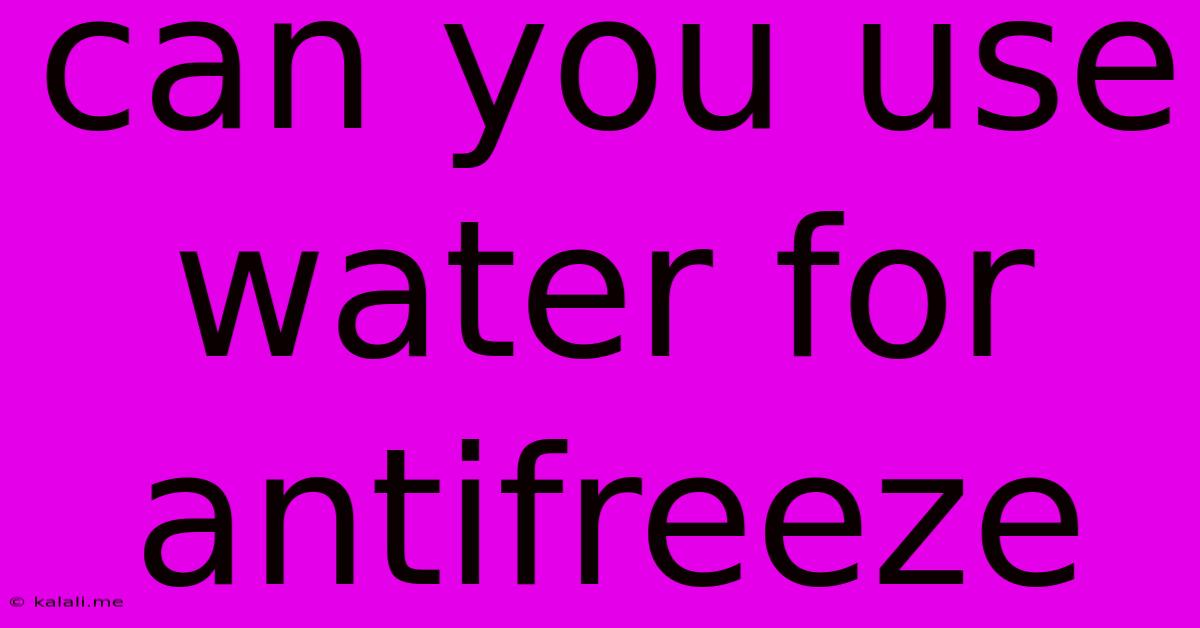Can You Use Water For Antifreeze
Kalali
May 19, 2025 · 3 min read

Table of Contents
Can You Use Water for Antifreeze? A Deep Dive into Coolant Chemistry
Meta Description: Thinking about using water instead of antifreeze? Learn the dangers of this approach and why dedicated antifreeze is crucial for protecting your engine. This article explores the science behind coolant and the devastating consequences of using only water.
Using water instead of antifreeze in your car's cooling system might seem like a cost-saving measure, but it's a dangerously misguided idea. While water might seem like a simple solution to keep your engine cool, it lacks the critical properties of proper antifreeze, leading to severe and potentially irreversible engine damage. Let's delve into why you should never use only water.
The Crucial Role of Antifreeze
Antifreeze, also known as coolant, is far more than just a liquid to lower the freezing point of water. It's a carefully engineered mixture designed to protect your engine from both freezing and overheating. The primary components are typically ethylene glycol or propylene glycol, mixed with water and various additives.
Here's why antifreeze is essential:
- Freezing Point Depression: Water expands when it freezes, potentially cracking engine blocks and damaging critical components. Antifreeze significantly lowers the freezing point of the mixture, preventing this catastrophic damage, even in sub-zero temperatures.
- Boiling Point Elevation: Antifreeze also raises the boiling point of the mixture, preventing overheating, especially during strenuous driving or hot weather conditions. This prevents the formation of steam, which can lead to pressure buildup and engine damage.
- Corrosion Inhibition: Engine components are made of various metals that can corrode over time. Antifreeze contains corrosion inhibitors that protect these metal surfaces from rust and degradation, extending the lifespan of your engine.
- Lubrication: Some antifreeze formulations also contain lubricating properties that help maintain the water pump's efficiency and prevent wear and tear.
The Dangers of Using Only Water
Using only water in your cooling system exposes your engine to several significant risks:
- Freezing Damage: During cold weather, the water will freeze, expanding and causing cracks in your engine block, cylinder head, radiator, and hoses. This repair can be incredibly expensive, potentially exceeding the cost of the vehicle.
- Overheating: Water boils at a much lower temperature than the antifreeze mixture. This means your engine is far more susceptible to overheating, leading to warped cylinder heads, blown head gaskets, and other major engine problems.
- Corrosion: Without the corrosion inhibitors present in antifreeze, your engine components will be exposed to rapid corrosion, leading to premature wear and failure.
- Cavitation: The absence of antifreeze can contribute to cavitation, where the water forms vapor bubbles that collapse violently, damaging the water pump and other components.
Choosing the Right Antifreeze
It's crucial to use the correct type of antifreeze recommended by your vehicle manufacturer. Using the wrong type can lead to incompatibility issues, compromising the effectiveness of the coolant. Consult your owner's manual to determine the appropriate antifreeze type for your car. Typically, you'll find either ethylene glycol or propylene glycol based coolants. Propylene glycol is generally considered less toxic.
Regular coolant flushes and changes are essential to maintain the effectiveness of the antifreeze and prevent corrosion and other issues.
Conclusion
In conclusion, while water might seem like a cheap alternative, using it instead of antifreeze is a recipe for disaster. The potential damage far outweighs any perceived savings. Always use the correct type and amount of antifreeze recommended by your vehicle manufacturer to protect your engine's integrity and longevity. Ignoring this advice could cost you significantly more in repairs than the price of a bottle of antifreeze.
Latest Posts
Latest Posts
-
Does Old Rose Die At The End Of Titanic
May 19, 2025
-
Do Lupins Come Back Every Year
May 19, 2025
-
Standard Height Of A Door Knob
May 19, 2025
-
Improve Water Pressure In Shower Head
May 19, 2025
-
How Long Do Scrambled Eggs Stay Good In The Fridge
May 19, 2025
Related Post
Thank you for visiting our website which covers about Can You Use Water For Antifreeze . We hope the information provided has been useful to you. Feel free to contact us if you have any questions or need further assistance. See you next time and don't miss to bookmark.